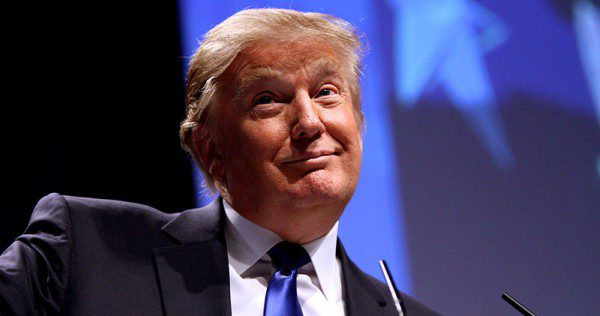Today we welcome George Marsden back to the Anxious Bench. One of the preeminent historians of evangelicalism, George previously weighed in on whether evangelicalism can survive Trump. Here he returns with a provocative thought experiment, adapted from a portion of an essay he is contributing to Evangelicalism, its History, and its Present Crisis, a forthcoming book (Eerdmans, 2019) he is editing together with David Bebbington and Mark Noll.
For those who are (as I am) puzzled and sometimes troubled by how so many fellow believers support and even celebrate Donald Trump and so seem to be ready to subordinate some of their religious and moral convictions to political expediency, I suggest a thought experiment:
Let’s suppose that in some slightly altered historical circumstances, Trump, or someone a lot like Trump, had decided he had a better chance playing the role of a populist Democrat.
Then, by promising everything to almost everyone, he had unexpectedly been elected.

Even if the Democratic Trump would have had to hide his racism, he would have been the same in his essential dishonesty, his constant attacks on the line between fact and fiction, his narcissism, his background of corruption, his record of exploitation of women (despite the Democratic Trump claiming to champion of equality and male accountability), his lack of discernible principle, his disdain for the Constitution and the rule of law, his intimations that his critics in the press should be suppressed, his vilification of his enemies, and his ignorance combined with reckless and ungenerous “America first” ventures in foreign policy.
At first, we can imagine, many principled Democrats would have deeply opposed his nomination and some would have declared themselves to be in the “NeverTrump” camp. But the rank and file would have been energized and many of the working classes would have been brought back to the party.
And then let’s say that the Democratic Trump administration would have succeeded in establishing a single-payer health-care system, tightened environmental regulations, instituted sensible gun-control laws, and appointed several Supreme Court justices who would ensure protections of progressive views for the next generation.
Some principled NeverTrump Democrats would continue to hold out. But it also seems likely that a good many sincere American Christians who had deep concerns for social justice, progressive social causes, and the environment would come around to saying that achieving these goals made it well worth it to support this scoundrel—or they might become blind to the degree that he was a scoundrel, a horrible model for children, and possibly a threat to the republic and to world peace.
One might imagine that, even if some of his policies and practices seemed clearly to violate Christian standards, some sincere Christian leaders would accept invitations to the White House, perhaps to influence him and at least to show the world their support. One could even imagine some saying that God had raised him up to save all these lives, to do justice, and possibly even to save the planet.
This fantasy is not intended, as I hope should be evident, to justify support for Trump nor to suggest a moral equivalency regarding the policy issues involved. Those policy issues and questions of political priorities are still issues that Christians need to discuss as civilly as possible, and that is always difficult in times of extreme polarization. And those debates on substantive issues became all the more difficult after 2016 because the actual Trump succeeded in part by appealing to some of the worst instincts, including racism, xenophobia, and misogyny, inbred among many white-ethno Americans. So it has been difficult to separate the actual Trump’s character (or the character he plays) from some of his policies.
Still, granting that many white evangelical Christians have been susceptible to the low prejudices that Trump cultivates, there are many other white evangelical Trump voters who should not be lumped into that category. Probably the largest number of these others are those who vote largely out of party loyalty and, perhaps reassured by Fox News, soon come to support pretty much whatever their party is doing and to overlook or forgive the faults of their leaders.
Some such Trump sympathizers, in turn, may also find some assurance from the pronouncements of another smaller more theoretically minded group of conservative evangelicals who are supporting Trump not because of their low principles (though we all may have some of such) but primarily for what they see as high principles, of which they see anti-abortion as preeminent. The prospect of gaining such goals may lead this latter group of principled supporters either not to perceive many of his character flaws and /or to say that “no one is perfect” and that we should suspend some of our usual Christian standards for the sake achieving higher political goals.
So one benefit of this thought experiment is to help recognize that even among white evangelical Christians who support Trump there are varieties of reasons for doing so and not everyone in that group should be lumped into one stereotyped characterization.
Conceivably, another possible use for this little historical fantasy might be in trying to communicate with Trump supporters who think that some accounts of his character, such as those in the fantasy itself, are unduly harsh. One might invoke, if it is possible to do so in a winsome way, this plausible scenario of Trump running and winning as a Democrat as a way of asking how they (even in their most generous and non-partisan moments) would then assess his character, his regard for the Constitution, and his regard for the best principles of the American heritage?
But a more significant benefit of this thought experiment is that it might be a first step for those of us who think it self-evident that Trump’s character makes him unfit for the presidency to try to understand what may otherwise seem like totally inexplicable behavior of some of our fellow Christians. It is a way to remind ourselves, as Reinhold Niebuhr used to remind us, that in a fallen world obsessed with politics, and especially at times when political opinions are highly polarized, we all are in danger of seeing our favorite causes as being so righteous that we let our political loyalties overwhelm our other Christian principles and sensibilities.
It may be true that almost all political bargains are to some degree corrupt. Yet some are more corrupt than others and ought to be condemned and avoided. Our partisanship and sense of self-righteousness can easily blind us to recognizing that difference.
Nonetheless, as I said, such an exercise in trying to put oneself in the shoes of those with whom one deeply disagrees is only a first step. I realize it will leave many with frustrations about the political gap that divides believers and about how to communicate across that gap. Still, I wonder if it is not a useful first step.













